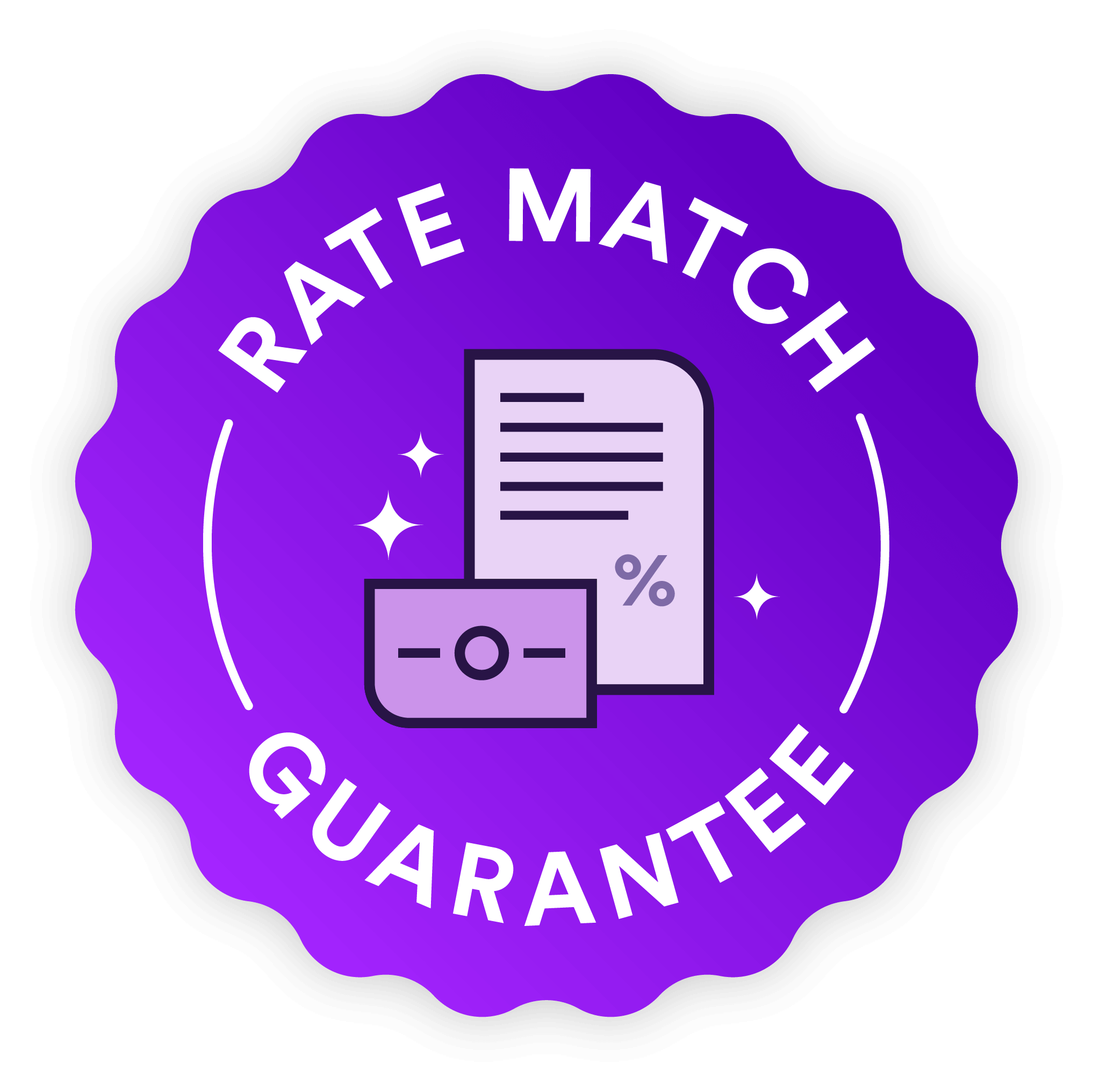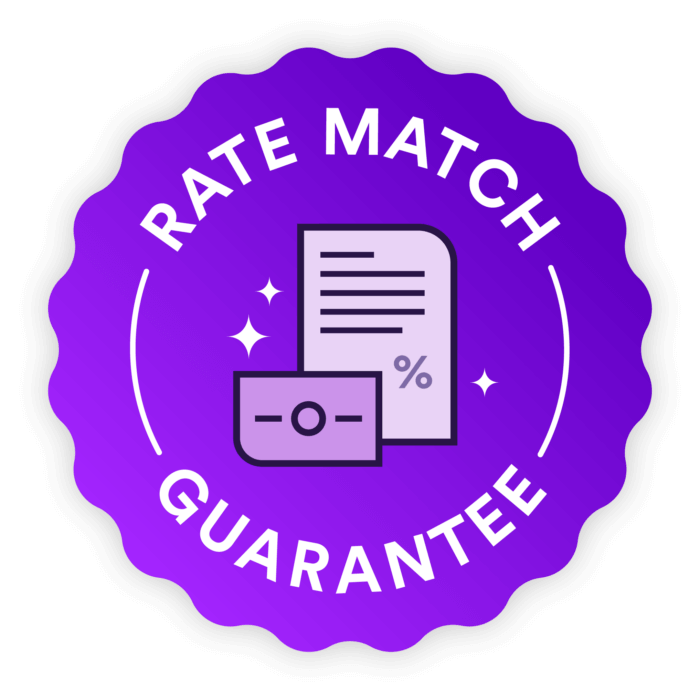Private Student Loans
Seriously Simple. Seriously Supportive.
You are not a number. Get the flexibility, low rates, and security you need, along with the personal guidance you deserve.
Interest Rates
A cosigner could lower your rate
Want a lower interest rate? Cosigned student loans tend to have lower interest rates because cosigners usually have a longer credit history. Plus, students are 5X more likely to be approved with a cosigner.
These are our lowest starting rates and contain our 0.25% Auto Pay discount from a checking or savings account. Some borrowers may see higher rates based on their credit.
100% Rate Match Guarantee

We’ll match any competitor rate and give you a $100 Amazon gift card once your rate match is finalized.
Call us today to get a rate match (888) 601-2801.

Client Happiness is at the heart of Earnest

Questions or concerns? Our in-house Client Happiness team has the power to solve your problems and set you up for success. We can even assist you in submitting your application over the phone.
You can reach us via email and web chat; if you prefer to speak to a real person call between 5 am-5 pm PST, Monday-Friday, at (888) 601-2801.

Find the best loan for you
Benefits
Financial responsibility meets college funding
Radically-Flexible Terms
Pick your payment from 4 options. Adjust your term down to the month for an ideal loan.
50% Longer Grace Period
For students who need time to start payments, we give 9 months vs. the standard 6 months.
Save On Interest
With 0.25% Auto Pay discount and lower your chances of accidentally missing a payment.
A helping hand for cosigners
Cosigning isn’t always easy, unless it’s with Earnest. Our cosigners have access to expert help, a convenient mobile application and secure end-to-end encryption to protect their financial information.
- Easily start the application for a student and share with a single tap of a button
- Mobile-friendly cosigner invitation if your student starts the application first
- Email and SMS updates to keep you informed about where you are in the application process


Compare
A step above the competition
A step above the competition
It makes sense to explore your options. See how we stack up against our competitors and make the best choice for you.
 Earnest Horizontal Logo
Earnest Horizontal Logo
|
SallieMae | Discover | Citizens |
|---|---|---|---|
|
eligibility check
|
eligibility check
|
eligibility check
|
eligibility check
|
|
zero fees
|
zero fees
|
zero fees
|
zero fees
|
|
9-month grace period
|
9-month grace period
|
9-month grace period
|
9-month grace period
|
|
choice of loan terms
|
choice of loan terms
|
choice of loan terms
|
choice of loan terms
|
|
skip 1 payment a year
|
skip 1 payment a year
|
skip 1 payment a year
|
skip 1 payment a year
|
Feature comparison current as of March 1, 2023
Get the FAQs on Private Student Loans
Before applying for private student loans, it’s best to look at other sources of financial aid and check out the Department of Education website at studentaid.gov. It’s recommended that you use a 4-step approach to get the funds you need:
1) Look for educational funding you don’t have to pay back, like scholarships, Pell grants, in addition to other grants, and work-study opportunities.
2) Fill out a FAFSA® form to apply for federal student loans. Federal unsubsidized loans don’t collect interest while you are in school. Most federal student loans don’t require a credit check or a qualifying cosigner, and offer federal programs if you’re struggling with payments.
3) Consider asking a parent to look at federal parent loans. The Parent PLUS loan is issued directly to parents or guardians of current students.
4) Look at a private student loan to cover any differences between your total cost of attendance and the amount not included in steps 1-3.
To learn more about federal student loan programs, visit the U.S. Department of Education. You can also fill out a free application for federal student aid or FAFSA® here.
The best private student loans should give you a low interest rate that will complement your federal financial aid. Keep in mind that you will accumulate student loan interest on both federal student loans and private student loans over time, so you want to find the lowest rates possible.
Before looking for loans with private financial institutions, such as online lenders, credit unions, or banks, explore all of your education loan options with the federal government.
Federal loans have different loan limits. They depend on the type of student loan, what year of school the student is applying for, as well as whether the student is considered a dependent (relying on their parents/guardian for financial support) or independent.
A student is considered independent if he or she meets any one of the criteria below:
- Is married
- Is in grad school
- Will be 24 years old before January 1 of the school year for which they’re applying
- Has been legally emancipated from parents or guardians
- Has a child or dependent
- Is on active duty or a veteran of the U.S. armed forces
- Was orphaned or in foster care after age 13
- Was determined to be an unaccompanied/homeless youth
Below are the borrowing limits for different students.
Dependent undergraduate students
First year: $5,500 total / $3,500 subsidized
Second year: $6,500 total / $4,500 subsidized
Third year and beyond: $7,500 total / $5,500 subsidized
Total limit: $31,000 / $23,000 subsidized
Independent undergraduate students
First year: $9,500 total / $3,500 subsidized
Second year: $10,500 total / $4,500 subsidized
Third year and beyond: $12,500 total / $5,500 subsidized
Total limit: $57,500 / $23,000 subsidized
Graduate students (unsubsidized only)
Annual limit: $20,500
Total limit: $138,500 (including undergraduate loans)
Direct PLUS loans, which are another type of federal loan available to graduate students only, do not have the same restrictions—but they have higher rates than regular federal student loans.
Private student loan lenders have different limits that vary depending on the cost of attendance of the school. A private student loan may cover up to 100% of the cost of attendance. Before applying for a private student loan, remember to apply for federal aid. You can start the application process for a federal loan on the FAFSA® website.
Eligible students must be:
- Attending, or enrolled to attend, full-time at an eligible 4-year Title IV institutions
- Residing in the District of Columbia or a state that Earnest lends in (all but NV)
- The age of majority in their state of residence
- A U.S. Citizen or Permanent Resident or have a cosigner who is a U.S. Citizen or Permanent Resident
View full eligibility details on our Eligibility page.
If you meet all of Earnest’s eligibility criteria, you may be approved for a loan as a solo applicant—but applying with a cosigner who has good credit may increase your chances of approval. Many students see higher interest rates if they apply without a cosigner.
If you are not a U.S. Citizen or Permanent Resident, you may only apply with a cosigner who is.
If you apply with a cosigner and later would like to do a cosigner release, we regret to inform you that we do not offer this option at this time. However, you can refinance your student loans in your own name without a cosigner upon graduation. Refinancing is subject to the following eligibility requirements.
Please keep in mind our eligibility criteria for student loan cosigners:
- A U.S. Citizen or Permanent Resident
- 3+ years of good credit history
- A minimum credit score of 650
- No history of bankruptcy
- Minimum yearly income of $35,000 (in USD)
- Both primary and cosigner must live in the District of Columbia or a state that we lend in (all but NV), but they do not need to both live in the same state.
Federal student loans and private student loans have different qualifications for student loan borrowers. You must fill out a FAFSA® to find out if you qualify for federal financial aid. You do not need to fill out a FAFSA® for a private student loan. Federal and private student loans may also have different loan terms, grace periods, repayment plans, and monthly payments.
The table below compares eligibility requirements for federal loans vs. Earnest private student loans:
Federal Student Loans |
Private Student Loans |
|---|---|
| Must be a citizen or eligible permanent resident | Must be a citizen or eligible permanent resident OR have a cosigner who is |
| Can live in any state to qualify for financial aid | You live in the District of Columbia or a state that we lend in (all but NV) |
| Must have a high school diploma or equivalent | No diploma or GED requirement |
| At least half-time enrollment at an eligible institution | Full-time enrollment at an eligible institution |
| Must submit the FAFSA® for a federal loan | Must apply directly with the private lender |
| No specific age requirement | Must be the age of majority (18 in all states except Alabama [19], Mississippi [21], and Nebraska [19]) |
| Must maintain Satisfactory Academic Progress for a federal loan | No Satisfactory Academic Progress necessary |
| No credit-based requirements | Must meet credit requirements or have a cosigner who does for a private lender, such as Earnest |
If you meet all of Earnest’s eligibility criteria, you may be approved for a loan as an independent applicant. However, applying with a cosigner who has good credit may increase the probability of getting approved and may lower the cost of your loan.
If you are not a U.S. Citizen or Permanent Resident, you may only apply with a cosigner who is.
Please keep in mind our eligibility criteria for cosigners:
- A U.S. Citizen or Permanent Resident
- 3+ years of good credit history
- A minimum credit score of 650
- No history of bankruptcy
- Minimum yearly income of $35,000 (in USD)
- Both primary and cosigner must live in the District of Columbia or a state that we lend in (all but NV), but they do not need to both live in the same state
Benefits
Federal student loans offer borrowers certain protections that private student loans may not, such as income-based repayment, public service loan forgiveness. That includes any future waiver or government forgiveness.
Private student loans offer different loan terms and may offer lower student loan interest rates. Federal student loans tend to offer Income-based repayment or loan forgiveness. Meanwhile, a private lender may offer other benefits, such as flexible payment terms or a lower interest rate.
Borrowing limits
Federal student loans have borrowing limits (similar to limits on credit cards). If the cost of attendance exceeds the federal loan amount, that means you will need to cover the leftover cost. Graduate students may apply for no-cap Direct PLUS loans from the government, but undergraduate students do not have a Direct loan option.
Cost of attendance
Many students choose to apply for a loan with a private lender to cover their leftover college costs, such as books, housing, or computers. Earnest private student loans, in addition to covering the entire cost of attendance, also have rates that are based on the credit profile of you and/or any cosigner you have. This may mean higher or lower rates than those offered by federal loans, depending on the credit profile.
Grace periods and origination fees
A private student loan may offer a longer deferment period or grace period
than a federal student loan. Some private lenders, such as Earnest, don’t charge an origination fee while some federal student loans do.
Auto Pay benefits
With Earnest, you can get a 0.25% APR rate discount when you agree to make monthly principal and interest payments by automatic electronic payment. Also, being enrolled in Auto Pay
helps most of our clients make on-time payments because the minimum payment is automatically deducted from their accounts.
For both private student loans and federal student loans, you must sign a promissory note stating that you will repay the full amount. Essentially, a promissory note is your student loan contract.
Forgiveness Programs
Students who take out private student loans do not qualify for any current or future federal benefits or student loan forgiveness programs. That includes any current or future federal student debt cancellation or student debt relief. However, some private student loan companies offer forbearance and will work with you in a debt relief plan, depending on your individual situation.
Repayment Plans
Federal student loans offer unique benefits, such as income-driven repayment plans, whereas now all private loans have the same option. Earnest Private Student Loans for example, offers four different repayment plans and you can learn more about them here.
First, Earnest offers a deferment period that’s 3 months longer than most lenders. That means you don’t have to make student loan payments up to 9 months
after you graduate. However, if you choose to make interest or principal balance payments while still in school, you will not be able to defer your loan payment after graduation.
To learn more about Earnest student loan repayment terms, visit the Help Center.
With Earnest, you can choose from four repayment plans to pay off your student loan balance.
To make in-school payments more manageable, Earnest allows students to make $25 automatic payments while they are in school. Other in-school repayment options include paying for the accrued interest, deferring payment for 9 months after graduation, or making the interest and principal payment on your loan. Also, Earnest does not have any prepayment penalties, late fees, or origination fees.
APR
An APR (both fixed and variable APR) is the interest rate plus any fees you pay your lender, but because Earnest does not charge origination fees, our interest rates are equal to our APR, or “annual percentage rate.”
For details on this, check out our blog post on the topic.
Interest Rates
There are two types of interest rates – fixed interest and variable interest. A fixed rate will not change and tends to be higher. A variable rate loan tends to offer lower interest rates, but that interest can fluctuate, making your payment less predictable over the life of the loan. Before taking out a private student loan, make sure to compare interest rates and read the fine print on all of your loan applications.
Earnest offers both fixed and variable interest rates. If the interest rate stays the same throughout your Earnest loan term, you have a fixed interest rate; it will not change throughout the repayment period. If you have a variable interest rate, it may change over time. After you graduate and begin working, you may want to consider refinancing your student loan debt for lower interest rates. You can learn more about student loan refinancing with Earnest here and about loan products from Earnest partners.
We offer student loan refinancing. Please visit our refinancing page to learn more and to check your interest rate.
We do not offer student loan consolidation at this time. These types of loans tend to combine all loan payments into one, while refinancing is meant to give you a more favorable interest rate or payment.
Although you can refinance multiple student loans with Earnest, a consolidation loan differs from student loan refinancing even though they can be used to achieve the same financial goal.
When your loan is approved, we will send money directly to your school in a process called disbursement. The disbursement date is set by the school and cannot be adjusted by our team.
You can visit our Help Center to learn more. All of our student loan servicing is done in-house, and we are happy to answer any questions you may have about your loan or application.
We offer the following school loans, all of which fall under the Private Student Loans category: Private Graduate Student Loans for those in graduate school, Law School Loans, Medical School Loans, Undergraduate Student Loans, Business School Loans, Cosigned Student Loans, and Parent Loans.
If you are an international student, you will need to apply for a Cosigned Student Loan with a creditworthy cosigner who is a U.S. Citizen or permanent resident.
To find out what creditworthiness (or recommended credit score) a cosigner needs to have and more information, check our eligibility guide to learn more.
The world has changed with the COVID-19 pandemic and the Biden Administration has extended the payment pause on federal student loans until December 31, 2022. We are confident that we will get through this together, and will continue to do everything within our power to support students and their families on their journey to higher education. If you have any questions about the White House COVID-19 student loan relief, we encourage you to visit the studentaid.gov page regularly to check for updates about loan relief.
Am I a good fit for an Earnest private student loan?
Before applying for private student loans with Earnest, use this checklist to see if you’re ready. View full eligibility details.
I’ve factored in contributions from my family, such as 529 plans (aka money already designated for your education).
I’ve applied for grants, scholarships, and work-study opportunities (aka money you don’t have to pay back).
I’ve filled out the FAFSA® to maximize my Federal financial aid (aka money you borrow that comes with repayment protections).
I am a U.S. Citizen or Permanent Resident
Both my student and I live in the District of Columbia or a state in which Earnest is licensed to lend – all but NV. (Note: you do not need to live in the same state.)
My income is above $35,000 per year
My credit score is above 650
Ready to apply? Here’s how it works.
Apply online
Fill out a quick online application on your own or with a cosigner.
Get a quick decision
Hear back on your application in less than 72 hours.
Pick your payment
Pick your repayment option, pay monthly or every two weeks.
*Earnest’s Loan Cost Examples: These examples provide estimates based on principal and Interest payments beginning immediately upon loan disbursement. Variable APR: A $10,000 loan with a 15-year term (180 monthly payments of $118.28) and a 11.69% APR would result in a total estimated payment amount of $21,290.40. For a variable loan, after your starting rate is set, your rate will then vary with the market. Fixed APR: A $10,000 loan with a 15-year term (180 monthly payments of $126.82) and a 13.03% APR would result in a total estimated payment amount of $22,827.79.
These examples provide estimates based on interest only payments while in school. Variable APR: A $10,000 loan with a 15-year term (180 monthly payments of $118.28) and a 11.69% APR would result in a total estimated payment amount of $26,173.03. For a variable loan, after your starting rate is set, your rate will then vary with the market. Fixed APR: A $10,000 loan with a 15-year term (180 monthly payments of $126.82) and a 13.03% APR would result in a total estimated payment amount of $28,186.67. Your actual repayment terms may vary. Other repayment options are available.
These examples provide estimates based on fixed $25 payments while in school. Variable APR: A $10,000 loan with a 15-year term (180 monthly payments of $162.65) and a 11.69% APR would result in a total estimated payment amount of $30,584.74. For a variable loan, after your starting rate is set, your rate will then vary with the market. Fixed APR: A $10,000 loan with a 15-year term (180 monthly payments of $181.27) and a 13.03% APR would result in a total estimated payment amount of $33,915.55. Your actual repayment terms may vary. Other repayment options are available.
These examples provide estimates based on deferred payments. Variable APR: A $10,000 loan with a 15-year term (180 monthly payments of $174.79) and a 11.69% APR would result in a total estimated payment amount of $31,462.16. For a variable loan, after your starting rate is set, your rate will then vary with the market. Fixed APR: A $10,000 loan with a 15-year term (180 monthly payments of $193.75) and a 13.03% APR would result in a total estimated payment amount of $34,874.28. Your actual repayment terms may vary. Other repayment options are available. It is important to note that the 0.25% Auto Pay discount is not available while loan payments are deferred.
SLR making principal and Interest payments beginning immediately upon loan disbursement. Variable APR: A $10,000 loan with a 20-year term (240 monthly payments of $107.96) and a 11.69% APR would result in a total estimated payment amount of $25,909.23. For a variable loan, after your starting rate is set, your rate will then vary with the market. Fixed APR: A $10,000 loan with a 20-year term (240 monthly payments of $117.37) and a 13.03% APR would result in a total estimated payment amount of $28,169.13.




